Scholars program uncovers mystery behind MLS profession
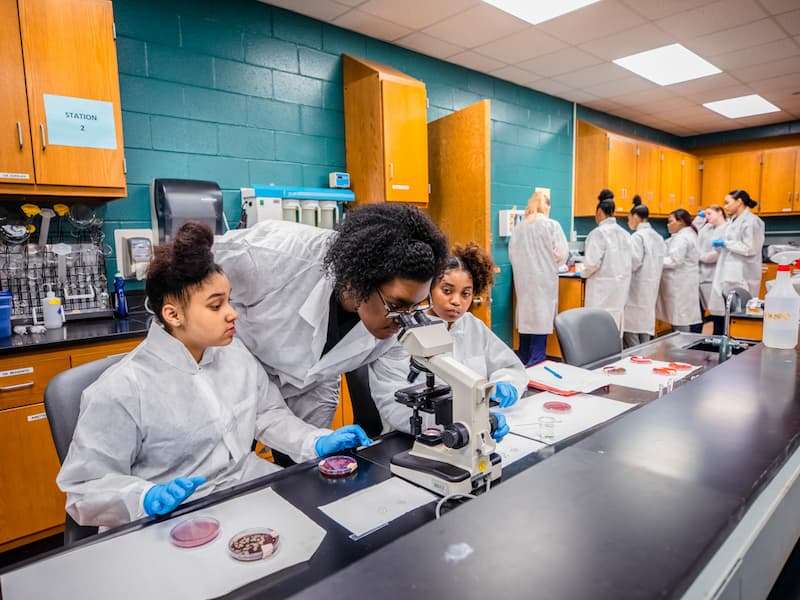
EDITOR’S NOTE: A version of this story originally appeared in the Fall 2020 edition of SHRP REACH, the magazine for University of Mississippi School of Health Related Professions alumni. Photos included in this story were taken prior to the CDC's COVID-19 masking guidelines.
The first reaction is usually, “I didn’t even know about this profession.”
That’s quickly followed by, “I thought doctors and nurses did all the tests and interpretations.”
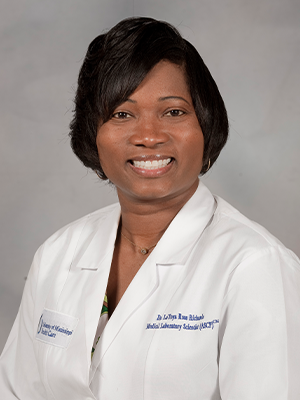
Dr. La’Toya Richards- Moore and her colleagues in the Medical Laboratory Science Program are regularly greeted by surprised faces whenever they host lab activities for local students or give presentations to youth in the Jackson metro area.
When most high school students consider careers in medicine, they almost exclusively think about becoming doctors, nurses and dentists, according to Richards-Moore, program director, Medical Laboratory Science in SHRP. She said building awareness of allied health programs like hers is fundamental to the future of health care in Mississippi – and the nation.
“MLS is the hidden profession,” Richards- Moore said. “If the labs weren’t conducting the tests, how would doctors and nurses know what to do for their patients? Without the lab work, they couldn’t make any diagnosis or make any sound determination that would be beneficial for their patients.
“We may not be seen, but we are very vital to the health care team.”
In partnership with the School of Nursing at the University of Mississippi Medical Center, the Health Care Scholars Program aims to educate up- and-coming high school students about the profession and stimulate interest in medical laboratory science as a potential career.
For the last three years, Richards-Moore has shepherded the program, which started with Lanier High School in Jackson and has grown to include Watkins Elementary School in Jackson, Camden Elementary School in Madison and Germantown High School in Gluckstadt, among others.
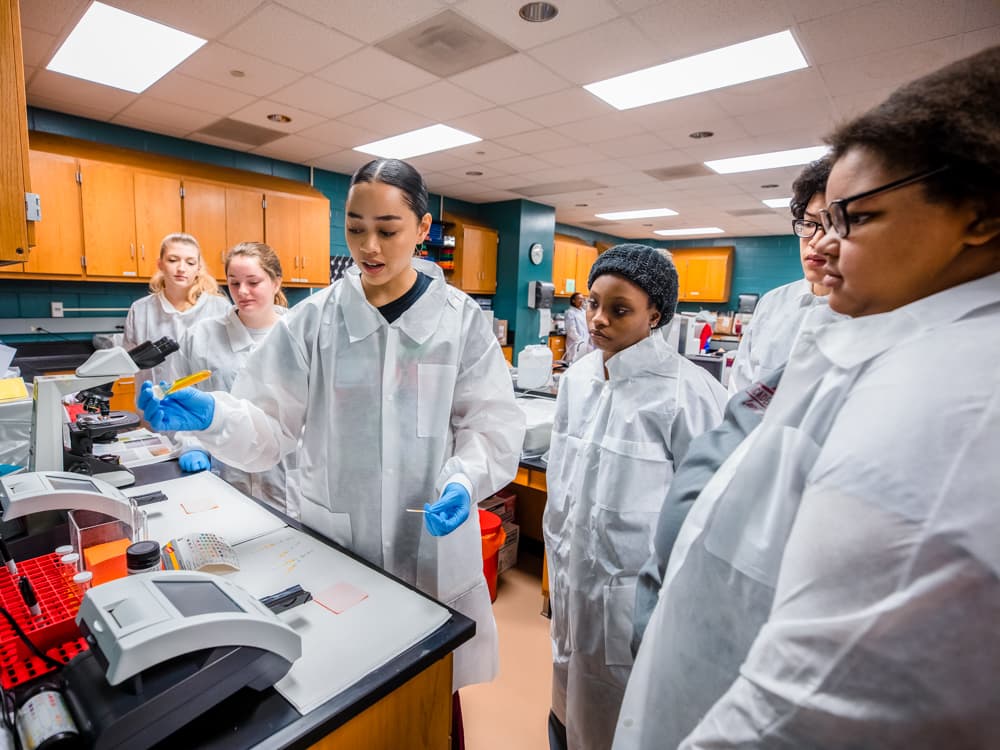
“We’ve actually gone to career fairs at the schools and hosted projects in the Lanier science lab,” she said. “We’ve welcomed the students into our (SHRP) lab and taught them how to make an isolated strand of bacteria, then shown them how to view different types of bacteria with a microscope. We’ve shown them how we test bodily fluids and how we interpret the results.”
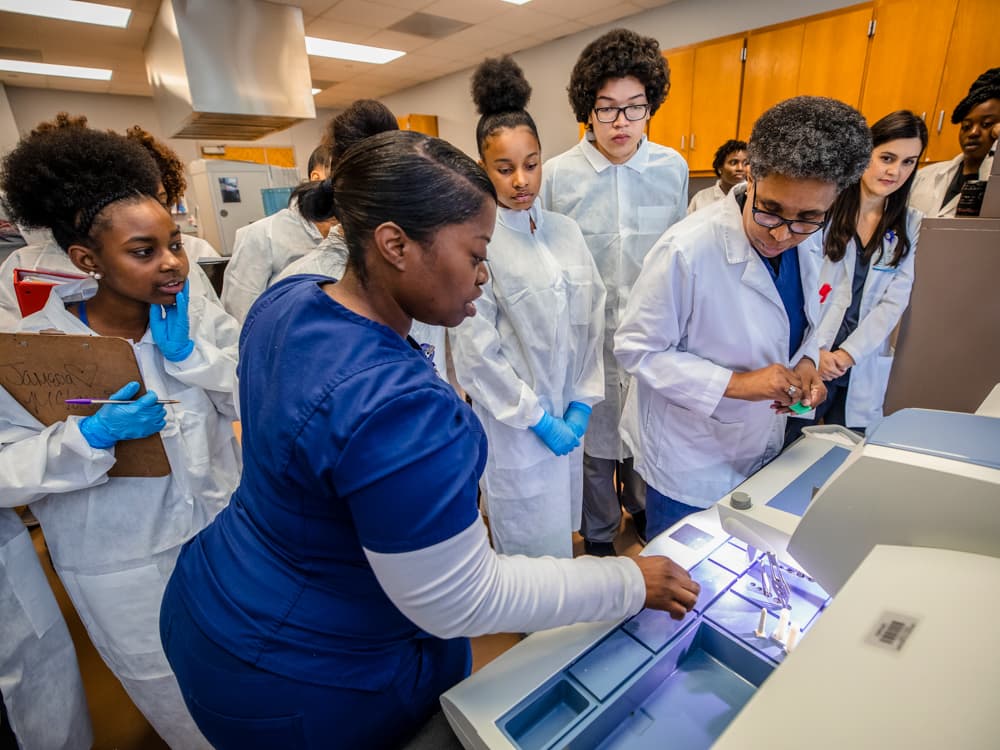
Depending on the types of classes, the ages of the students and the individual instructors’ wishes, SHRP faculty may host demonstrations using actual equipment – such as microscope analyzers – to examine real samples – such as test cultures, swabs, urine specimens or other anatomical items – to uncover the world of medical laboratory science.
“It’s very popular,” Richards-Moore said of the demonstrations. “The kids love to look into the microscope, they love to see the specimens. They get excited when we’ve done tests for opioids or drug screenings.
“For the elementary students, we may tailor the presentation to conditions prevalent in Mississippi, such as diabetes. We have anatomical models of unhealthy feet effected by diabetes, a giant blob of fat and what a healthy plate of food looks like.”
Richards-Moore and her colleagues welcome about 40 Germantown High School students to UMMC twice a year; Lanier High School sends a contingent of 25 or 30 each visit. Last year, her MLS team even visited the Oprah Winfrey Boys and Girls Club of Kosciusko.
In all, she estimates well more than 500 students have been exposed to MLS in one format or another – students who might otherwise have never considered becoming a laboratory scientist.
“We are always looking for opportunities to collaborate or partner with schools to reach these children,” she said. “These relationships are life-changing, both for the students as well as the faculty.”
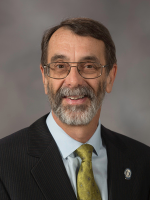
Dr. Rob Rockhold, professor of pharmacology in the School of Graduate Studies in the Health Sciences, and deputy chief academic officer at UMMC, serves with Richards- Moore on the Advisory Boards for the Lanier and Germantown Health
Science Academies. As a result of their participation, UMMC’s Simulation and Interprofessional Education Center staff work regularly with faculty and students from Lanier.
“The interactions provided by Dr. Richards- Moore for the Lanier and Germantown students are among the most expansive and rigorous of any available to those
health science academy students in the greater Jackson Metro area,” Rockhold said. “Germantown, especially, has progressed exceptionally well, recently achieving status as a Model Academy following a rigorous external national review” by the National Career Academy Coalition of the Academy of Healthcare Excellence.
“The Lanier HSA has progressed well also and has the unique circumstance of partnering with AMR to offer the ambulance driver certificate program that offers a job for certified students immediately upon high school graduation.
“Both the Germantown and the Lanier efforts demonstrate how individual schools partner with local resources to give public school students unique opportunities to enter health careers and encourage additional professional training in health care delivery. These efforts are another substantive way in which UMMC is meeting its primary mission to improve the health of all Mississippians.”
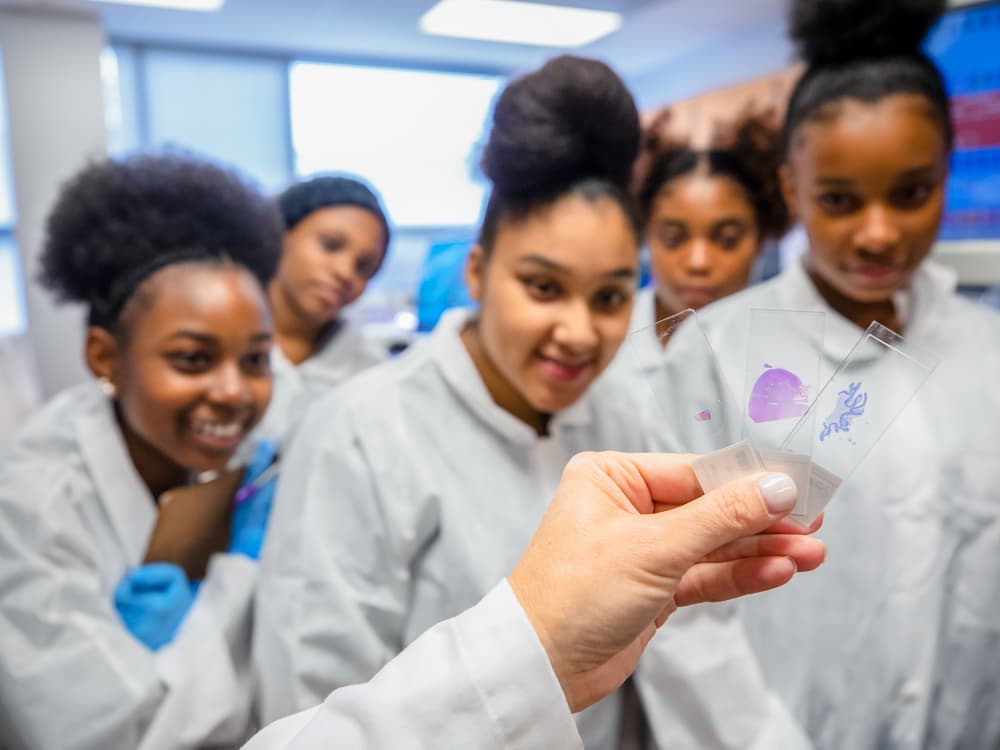
Richards-Moore understands how students can overlook medical laboratory science as a profession. Her initial career aspirations were to attend medical school. After taking the Medical College Admission Test, she was about to get married and decided to take a break after college.
While on a visit to SHRP, she received a catalog from a recruiter and applied to the school to study cytotechnology and MLS.
“When I was I accepted, I didn’t really know what MLS was,” she recalled. “But it turned out to be the best choice I ever made. For many (MLS) faculty, we were so set on thinking we were going to medical school, MLS was just an alternative to getting there.”
The alternative became their objective instead.
Last year, Richards-Moore obtained a $2,500 American Society for Clinical Pathology foundation grant, “Project ARM: Awareness, Recruitment and Maintenance,” to tell even more students about her profession. Eventually, she would like to conduct a study to determine how many youngsters have matriculated into the medical laboratory science field as a direct result of her program.
In the meantime, Richards-Moore and her MLS colleagues have been thrust into an unexpected limelight. Perhaps no single event in her career has demonstrated the need for dedicated MLS professionals than the recent COVID-19 pandemic, which through
its devastation has called a temporary halt on her Health Care Scholars Program but has nevertheless become another ‘teachable moment’ for her students – if remotely so.
“The Mississippi State Health Department has called many of our graduates and faculty members to help with COVID-19 testing,” she said. “It’s made our (Health Care Scholars Program) students aware there are professions that work alongside doctors, nurses and dentists to address this challenge and help keep people healthy.
“There’s a shortage of medical laboratory scientists. It’s a very rewarding profession because you’re actually helping to save lives, and there are career opportunities readily available.”


